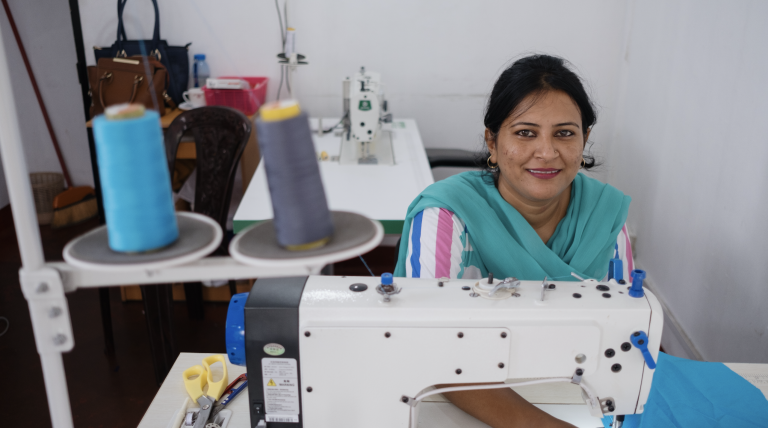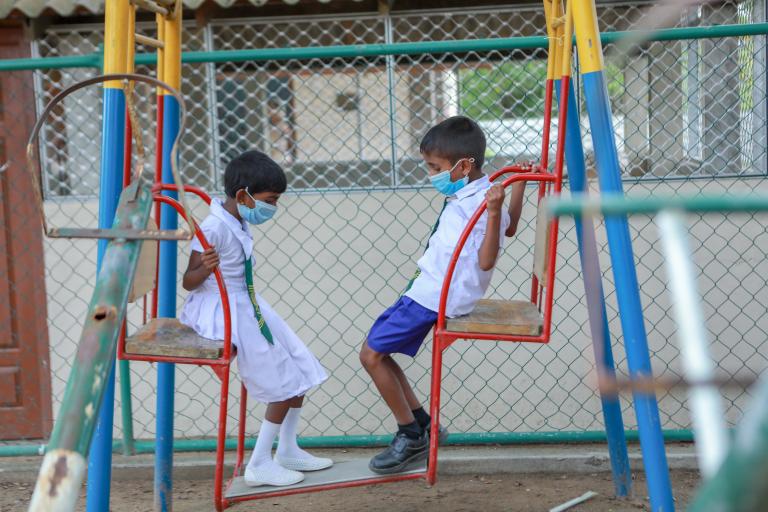
COVID-19 has reinforced the urgent need to build more resilient societies. In 2021, the UN built upon its platform established in 2020 to drive support for a commitment by the Government of Sri Lanka to move towards a nationally-defined social protection floor. Components of this agenda include evidence generation and policy analysis to modernise the social protection system in Sri Lanka; social dialogue to promote a shared understanding of social protection and build support for reform; national capacity-building to strengthen existing delivery systems; and direct support to vulnerable groups to expand the range of services provided by national delivery systems.
The UN engaged in a Tripartite Dialogue promoting a shared vision for social protection in Sri Lanka, engaging the Ministry of Labour and State Ministry of Samurdhi, Household Economy, Microfinance, Self-employment and Business Development, with further consultations scheduled for 2022. UNFPA engaged with parliament to re-establish the Sri Lanka Forum for Parliamentarians on Population and Sustainable Development and build support for implementation of the Programme of Action from the International Conference on Population and Development’s ‘Nairobi Summit’ held in 2019. UN advocacy also played a pivotal role in the extension of “nutrition basket” provisions for pregnant mothers announced in the 2022 Budget Speech (see Food Security and Nutrition page 9).
Despite challenges and restrictions posed by COVID-19, the UN was successful in strengthening national social protection systems strained by the pandemic. In partnership with the Ministry of Tourism, ILO co-designed a short-term COVID-19 response scheme and longer-term unemployment insurance for tourism sector workers in Sri Lanka, while promotion of dialogue towards social protection through the tripartite platform of the National Labour Advisory Council (NLAC) took place with the Ministry of Labour. WFP piloted a biometric authentication system for the Samurdhi programme—the country’s primary social assistance and poverty reduction scheme—in flood-prone areas of the Kalutara district. This system improved access to essential services for some 6,500 vulnerable beneficiaries, with plans to scale up in 2022. WFP led a multi-faceted programme jointly with Samurdhi authorities, providing a combination of cash transfers and strategic and behavioural change communications to over 1,500 vulnerable pregnant and nursing mothers in six districts with an aim to promoting healthy and diverse dietary practices and nutrition-related cash management behaviours. UNHCR and national partners for their part helped vulnerable refugees and asylum seekers to cope with economic and social shock and address gaps in social protection coverage during the most critical parts of the pandemic, with vouchers for food, medicine, and other necessities benefitting some 95 families.
Additionally, UNICEF’s Public Expenditure Review on Social Protection, to be finalised in March 2022, builds on an extensive body of research and analysis that considers the fiscal implications of delivering on the government’s commitment to expand the coverage of existing social protection systems.
The joint-agency Stakeholder Mapping of Sri Lanka’s social protection system led by UNDP in partnership with the Institute of Policy Studies (IPS), also slated for completion in March 2022, consolidates the existing programmes. In partnership with the World Bank, the UN also contributed extensively to the government’s consultation process for developing a National Social Protection Strategy for Sri Lanka. The findings from these activities, combined with evidence from the 2019 Household Income and Expenditure Survey, will help co-develop Samurdhi programme reforms with relevant authorities. The UN will also use the data to engage in a fiscal analysis of investment options in a more comprehensive social protection system. Meanwhile, UNICEF and WFP jointly provided cash transfers to over 630 families with children under five, allowing them to better cope with current challenges around food security and nutrition.
Education and Early Childhood Development
2021 was a difficult year for the four million students in Sri Lanka, with nationwide school and university closures during the COVID-19 pandemic severely affecting learning at all levels.

Tertiary education institutions were relatively well-placed to respond to the changes in teaching modality, although the adjustment of primary-level learning has been neither as quick nor as comprehensive. It will be important to monitor inequities in access to alternative modalities will translate into inequality of learning outcomes as children return to school in 2022.
The UN was quick to lend its support in this vastly reorganised learning environment. UNICEF worked with zonal education authorities in the country’s Northern Province to provide over US$1 million in urgent repairs to 13 schools, and capacity building in ICT and child-centred teaching and learning strategies for over 330 primary and secondary teachers. In Central and Uva provinces, more than 90,000 preschool-aged children received printed home-based learning kits during periods of school closure in 2021. The kits provided engaging ways to keep children reading, writing, exploring, and learning at home with the support of their families. In addition, the UN provided US$70,000 to establish professional development centres equipping 1,200 educators per year with the knowledge, skills, and practice to improve learning outcomes in primary education. UNICEF also worked closely with the National Institute of Education, providing US$50,000 in technical assistance to help shape the National Curriculum Framework on general education, including reforms for assessment and integration of transferable skills into the Framework.
In 2022, the UN will continue to support Sri Lanka’s National Institute of Education. Building on foundational data and evidence from a regional study in 2021 by UNICEF, UN support will encompass improvements and equitable access to primary education through investments in better data and monitoring systems for primary-level education outcomes, along with the implementation of disability-inclusive education practices.

